How to Build a Streaming App in 2025: Complete Guide
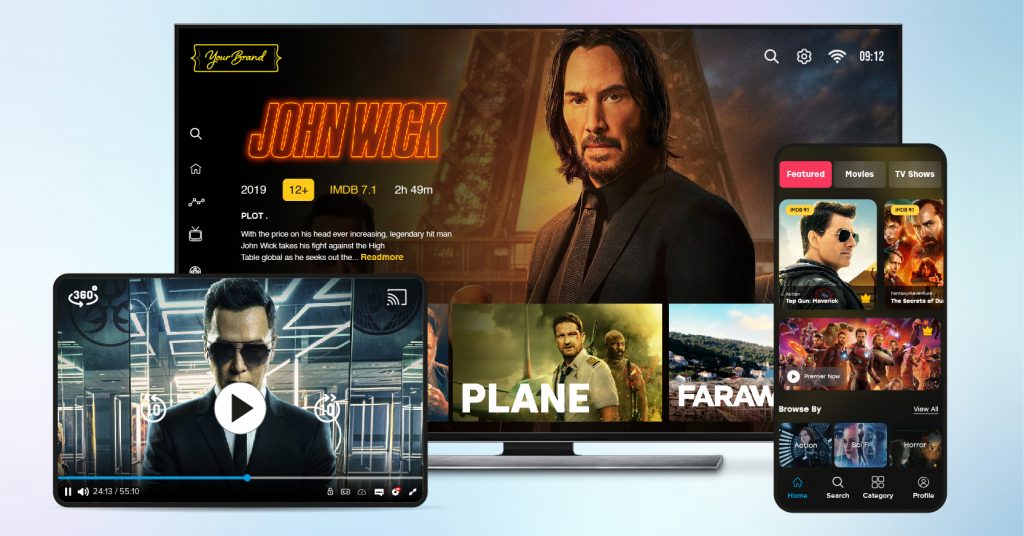
Do you ever find yourself in a situation where you have nothing to do and are looking for some kind of entertainment to consume?
Perhaps you are on a long trip or waiting for a flight at the airport.
Regardless, you reach for your smartphone and open the streaming app, and suddenly, you have access to an endless selection of movies, TV shows, and music.
Am I correct, Right?
Yeah! Equally impressive, these movie streaming apps have become a part of our daily lives, and with the rise of video on Demand services, these apps have only grown in more popularity.
In fact, according to recent statistics, the number of users of streaming apps has increased exponentially, and shows no signs of slowing down at all.
With this increased demand, many people want to utilize this opportunity and create their own movie streaming website or movie streaming apps.
However, the process of building a movie streaming app from scratch can seem complicated, especially for the inexperienced.
But fear not, because, in this blog post, we will take you through the necessary steps to create a successful movie streaming app.
So, if you are ready to join the biggest names in the streaming industry, let’s get started!
Grab a cup of coffee and let’s dive into the world of streaming app development!
- Fully Customizable
- Lifetime Ownership
- On-Premise/On-Cloud
- 100% White-label
- Zero Revenue Share
- Hire Developers
Table of Contents
Why Building Your Own Streaming App Would Be A Game-Changer
Developing your own streaming app is no easy task, but the benefits it brings can be a real game changer.
For starters, you have complete control over the content you provide. This allows you to tailor the content to your target audience’s tastes and preferences.
This customization can lead to greater engagement, better user retention, and even more loyal followers in the future.
Apart from this, it can open up a lot of money making opportunities. Yes, you read that right.
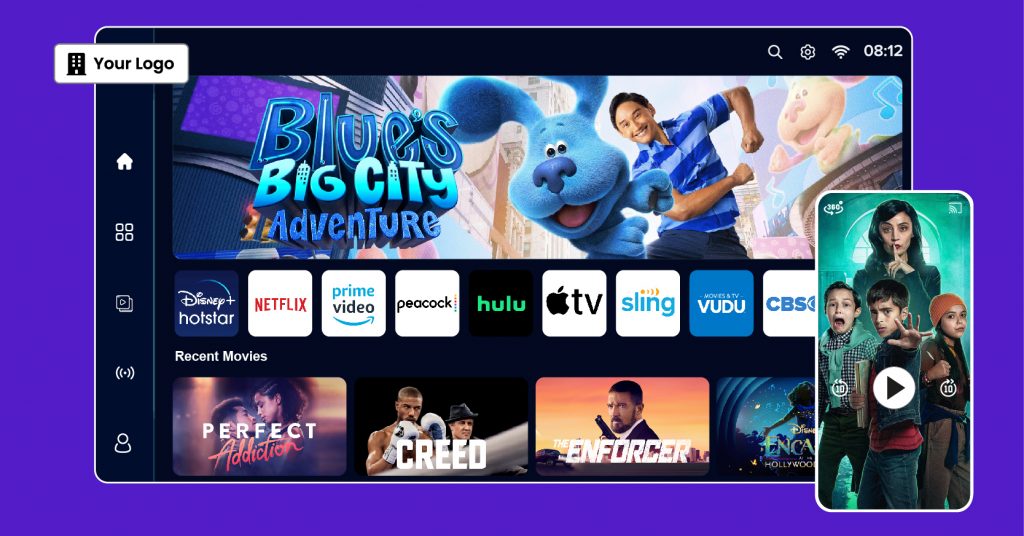
By now, if you are interested in creating a movie streaming app like Netflix, the good news is that it has never been easier than it is now.
With app development companies all across the globe, you can create your very own movie streaming app with little to no coding experience.
For faster processing, you may want to consider partnering with top OTT app development companies to help differentiate yourself from the competition.
Whichever route you choose, it will be a rewarding experience that can disrupt the entertainment industry and change the way people consume media.
Top Features While Creating A Streaming App
When designing a streaming app, it’s important to consider features that will set it apart from the race. Here are ten important things to consider when creating a streaming app for your business.
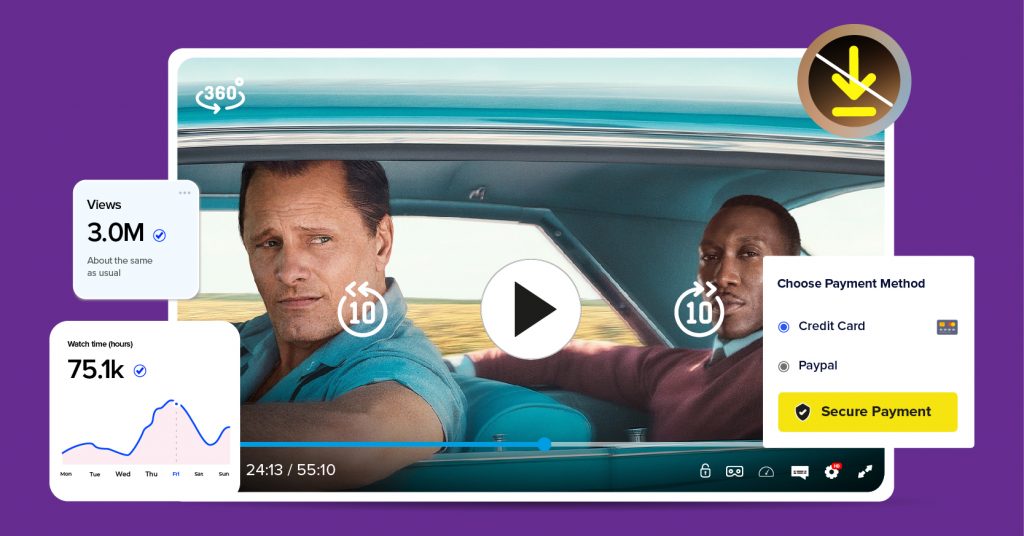
1. User Authentication And Account Management
The first thing to consider when creating a streaming app is user authentication and account management.
They are essential components of any streaming app. You must allow users to create accounts, login, and manage their account information.
This feature is important because it allows users to access their own content, create playlists, and access other features that require authentication.
Moreover, you can use a variety of authentication methods, including social media access, email access, and phone number access.
Offering a password reset option and two-factor authentication is also important to improve overall security.
Furthermore, you should allow users to manage account information such as name, email, password and payment information, among others.
2. Video Content Management
The success of any streaming app largely depends on the quality and variety of video content it provides.
Therefore, it is important to have a robust video content management software that can effectively store, organize, and deliver video content to end users.
This feature includes metadata management, content tagging, search functionality, and content recommendations.
A metadata system allows you to add descriptive text to any video, making it easier for users to search and extract from the vast array of resources available.
Content tagging helps further categorize videos into specific types, or themes, and increase the user’s ability to search for content that matches their interests.
The search function allows users to search for specific videos or content by entering relevant keywords.
Content recommendation uses ML algorithms to predict whether content will be of interest to users — based on their viewing history, search queries, and preferences.
These services help enhance the overall user experience and drive engagement, which increases retention and revenue as well.
3.Video Encoding And Streaming
This feature includes converting video content into a digital format that can be easily delivered to users via the Internet.
A good video encoding and streaming system should be able to provide high-quality video streaming that is fast, simple, and most importantly efficient.
Typically, in video encoding, the video content is compressed to reduce the file size and maintain its quality.
Additionally, it must be able to encode video in multiple formats to ensure compatibility with multiple network devices.
When it comes to streaming video, it includes delivering encoded video to users over the Internet.
However, it is also capable of changing the quality of the video based on the user’s Internet connection, to ensure trouble-free playback.
4. Personalization And Recommendations
In today’s rapidly changing world, users expect a personalized experience that matches their unique interests and preferences.
By creating personalized recommendations, streaming apps can keep end users engaged and coming back for more.
A good recommendation system relies mainly on the user data and analytics to understand user viewing habits, search history, and preferences.
This information can then be used to create custom playlists and recommend new content that users are likely to find interesting.
It can also extend to the app’s user interface. For example, a movie streaming app allows users to customize the content to make it more personal and visually appealing.
5. Search And Discovery
When building a streaming app, search and discovery features ensure that users can quickly and easily find the content they are looking for.
Without this feature, users may become a little discouraged and eventually stop using the app.
In fact, it allows users to search by keywords, titles, and other relevant filters (whatever comes to their mind at that time).
In addition to this, the streaming app should also offer personalized recommendations based on the user’s browsing history and preferences.
Other key features to consider include predictive search, autocomplete, and filtering by genre, release date, rating and criteria.
The app can also have a complex algorithm that takes into account user behavior and tweaks suggestions accordingly.
6. Payment Processing And Subscription Management
When it comes to any movie streaming app development, payment processing and subscription management is a must.
It ensures that users can easily sign up for subscriptions, manage their payments, and access premium or exclusive content.
However, it should be secure, convenient, and compatible with multiple payment methods.
The system should be able to handle repayments, cancellations and refunds, as well as provide users with an intuitive UI to manage their subscriptions
Here, content owners need to work with a trusted payment partner and implement strong security measures to protect sensitive information.
Above all, the app should also be able to send users alerts and notifications about payments, expired subscriptions, or special offers.
7. Social Sharing And Integration
Social sharing and integration refers to your streaming app’s ability to communicate and interact with different social media handles or platforms.
This can be done by adding features like social media video sharing, social media account sign-ups, app integrations, etc.
There are a few things to consider when creating a streaming app with social sharing and integration capabilities.
First, you need to decide which social media platforms you want to integrate with. As we know the popular ones are Facebook, Instagram and YouTube.
Once you have added your streaming app to social media platforms, you can use sharing features that allow users to share videos and content from your app to their social media profiles.
This can help your app to grow and attract more potential users.
8. Analytics And Reporting
As a business or website owner, having access to surveys and reports can help determine the success of your online presence.
With these tools you can track various metrics like website traffic, user behavior, conversion rate, and more.
One popular analytics tool includes Google Analytics, which gives you detailed insights into your website’s performance.
You can track user behavior, measure the effectiveness of your marketing campaigns, and gain valuable insights about your audience.
Above all, there are many other analytics and reporting tools that can help you monitor and measure your website’s performance.
These tools can be used to track social media metrics, email marketing campaigns, and even offline marketing efforts. Isn’t that amazing?
9.Multi-Language And Multi-Currency Support
Multilingual support allows your app to be translated into many languages, making it available to a wider audience.
This can also be achieved by using translation plugins and APIs, or by manually translating the content.
On the other hand, try to implement multiple currencies support so that the consumers can buy any content in their local currency.
This can be accomplished through payment gateways that support multiple currencies or currency conversion features.
It should be noted, however, that providing multilingual and multi-currency support requires careful planning and implementation.
In the backend, it is important to ensure that currency conversions are accurate and that exchange rates are regularly updated.
10. Scalability And High Availability
Scalability refers to your app’s ability to handle high traffic and user demands.
To ensure scalability, you need to design your app architecture in such a way that it is easy to use.
This can include implementing cloud-based infrastructure, implementing load balancing, and much more.
In fact, the streaming application has to remain up and running at all times, even if there is a server outage or server failure.
To ensure maximum availability, you will need to implement high levels of redundancy and failover mechanisms.
Overall, both features are important considerations when designing a movie streaming app like Netflix.
How To Create A Streaming App?
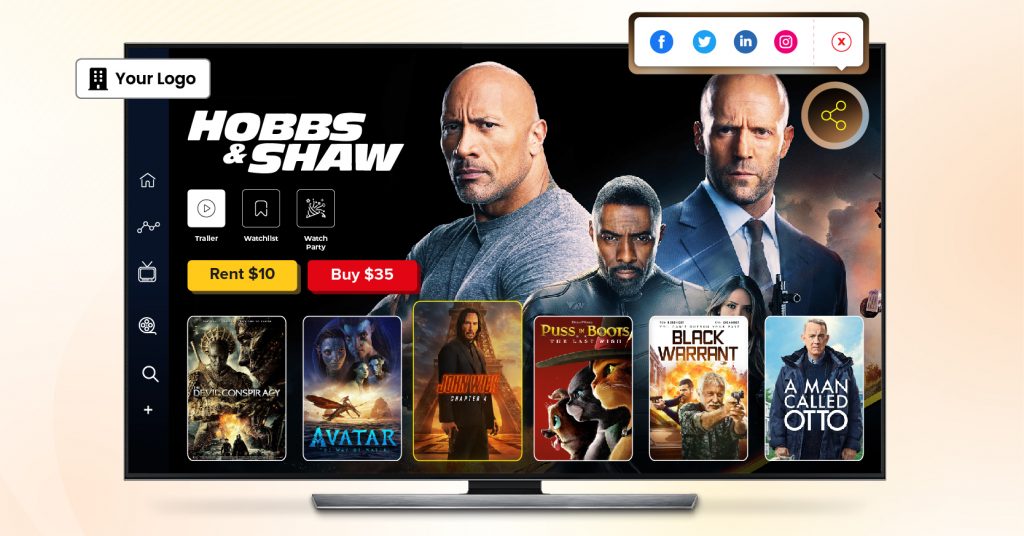
Creating a streaming app is no easy task, but it all starts with the important steps.
This involves identifying what makes your application different from competitors and the benefits it can provide to users.
Are there any special contents? A streamlined user experience? Whatever it is, make it clear and appealing to potential customers.
Here are some crucial steps to consider when developing a streaming app in 2025:
- Find your niche.
- Choose your content availability.
- Choose the monetization model.
- Know your requirements.
- UI/UX design.
- Create an on-demand MVP model.
- Gather feedback.
However, there are other points to consider as well before creating your streaming app, let’s get to know one by one in this section of the blog.
1.Find Your Unique Selling Point
When developing a streaming app, it is important to know the USP of your app. This can be anything from exclusive content to tailored user experiences.
By identifying your uniqueness, you can develop a strong value proposition that can attract and retain users.
One way to discover your USP is to analyze what your target audience wants.
By understanding what your audience wants, you can tailor your app’s features and content. You can also do market research to identify gaps in the market and look for opportunities to fill the space.
2. Know Your Audience
To create a streaming app that goes well with your target audience, it’s important to know who the audience are and what they want.
This means doing in-depth market research, analyzing data, and much more. By understanding what your audience wants, you can create engaging content that speaks to their interests and keeps them engaged.
However, you can use more data to personalize the user experience and offer recommendations to the end users based on their viewing history and patterns.
Recommended Reading
3.Select Your Streaming Model
When it comes to creating a movie streaming app like Netflix, there are a number of video streaming models to select from.
Each model has its personal advantages and disadvantages. Therefore, it’s far more important to pick out the one that fits your app’s objectives.
One famous streaming option is on-demand streaming, which allows customers to access content at any time.
Another popular alternative is live streaming, which lets in customers to observe activities in real time. This is a notable option for sports and entertainment.
In choosing a streaming model, it is also essential to consider factors such as bandwidth, server infrastructure, and Content Delivery Network (CDN) integration.
4. Make Money From Your Streaming App
Developing a streaming app is one thing, but making money out of it is the main thing. There are many monetization options to choose from. Here are a few popular monetization models to consider.
Subscription-based model: This model enables users to access content for a recurring fee, such as monthly or annually.
This model offers a predictable revenue stream, but may not appeal to users who only want to watch certain TV shows or movies.
Ad-Based Model: This model allows users to access free content but is fully connected by ads. This model can be useful if you have a large user base, but it can turn off users who don’t want to sit through ads.
Pay-per-view model: Pay-per-view enables users to access content once for a fee. This may appeal to users who simply want to watch a particular movie or event, but in many cases it may not generate a steady income.
5.Ensure Digital Security For Your Users
One thing we will all agree on is that digital security should be a priority. Users expect their personal information and viewing history to be kept private and secure on the servers.
Here are a few ways to ensure digital security for your users.
Use encryption: Make sure all user data is encrypted during check-in and at rest. This includes login credentials, personal information, and viewing history.
Make use of user authentication: Use user authentication systems such as two-factor authentication to prevent unwanted access to user accounts.
Update your security policy regularly: Keep up to date with the latest security policy and update your app regularly to address any data breaches or vulnerabilities.
Hire a security expert: Consider hiring a security expert to review the security of your app and make suggestions for improvement.
6. Better Payment Gateways Has To Be Implemented
One of the main considerations when choosing a payment method is security.
It is very important to ensure that the payment gateway you choose is PCI DSS compliant and uses encryption to protect users’ payments and personal information.
Another important consideration is fees. Each payment gateway has a price associated with it, which includes a transaction fee, a monthly fee and more.
It is important to consider these fees and choose payment gateways that align perfectly with your budget and income goals.
In addition to this, try to use popular payment gateways when developing a streaming app.
Also, be sure to thoroughly test the payments to make sure everything is working properly. This can help prevent payment errors and ensure a positive, hassle-free user experience.
7. Add Social Media Handles
Social media integration makes it easier for users to share and promote your streaming app’s content, thus increasing visibility and engagement.
Here are two key things to consider before adding social media handles to your streaming app.
Choose social media handles that align with your app’s target audience and content.
For example, if your app focuses on short videos, platforms like Instagram may be more appropriate. If your app focuses on longer content, platforms such as YouTube may be ideal.
Using social sharing features in your app can be a big step so that users can share content directly from your app to their social media profiles.
This can include things like social sharing buttons, embed codes, and automatic sharing of user profiles.
8. Maintain & Scale Up For Long-Term Success
Here, it becomes very important that your app design can accommodate traffic growth as your user base expands in the future.
This may require investment in cloud-based infrastructure or server upgrades to handle increased traffic and demand.
Never forget to take note of user feedback and incorporate it into your streaming app development roadmap.
This allows you to prioritize a number of new features based on the user’s requirements and preferences to identify areas for improvement.
You can maintain and grow your streaming app for long-term success by adhering to industry standards. Regular, scalable content updates, user feedback, marketing, promotions, and data analytics are all essential elements of a successful streaming app development.
How Much Does It Cost To Develop A Streaming App?
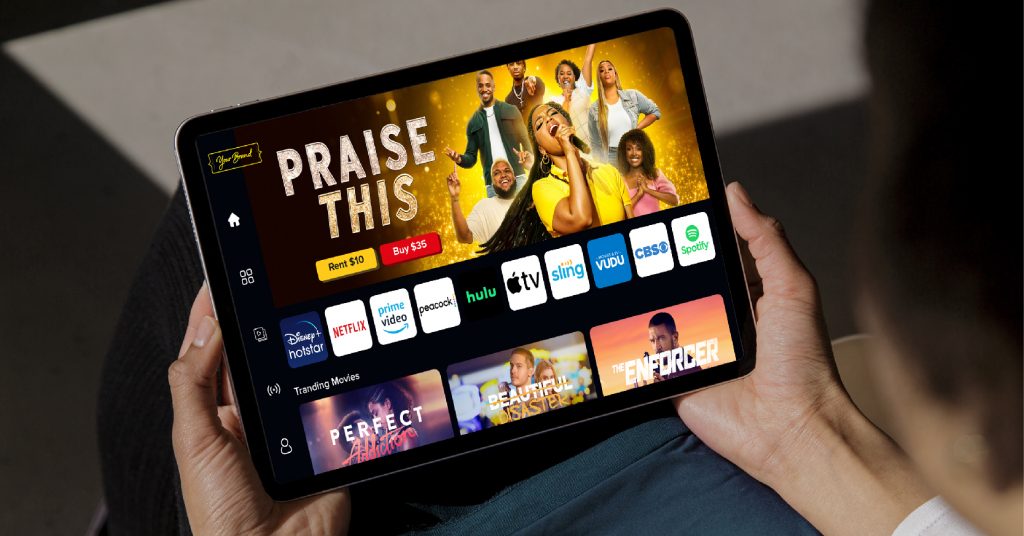
Many factors influence the cost of developing a streaming app. To be very precise, factors include app design, development team, features, technology stack and more.
In short, the more complex the app, the more expensive and time-consuming it will be. The number of platforms you want to support such as iOS and Android will also affect the cost.
Other features such as hosting, maintenance, and security features are included in the overall price. However, a basic app with limited features can cost $10k to $50k.
On the other hand, a more complex app that offers advanced features like live streaming, social media integration, and personalized recommendations can cost anywhere between $100k to $500k.
Costs can also vary depending on the location of the development team.
Cost-Saving Tips For Building A Streaming App
If you are worried about cost, fortunately, there are several cost saving tips that can help reduce the cost of developing a streaming app.
One way to save is to focus on creating an MVP (Minimum Viable Product) with the essential features before adding advanced functionality.
This way, you can test the app in the marketplace and see which feature is popular before investing money for streaming app development.
Another way to save money is to use open source software or existing solutions for certain features, rather than building from scratch.
You can also consider giving development to countries where labor costs are low or hiring freelancers instead of full-time employees.
Finally, it is important to work with a reputable product development team that can deliver clear value and high-quality applications.
Wrapping Up
Without a doubt, the streaming apps have changed the way we consume content, and with the right technical tools and know-how, you too can create your own custom streaming app or a movie streaming app as well.
Whether you are a content creator looking to distribute your work to a wider audience, or a business looking to offer customers a new service, a streaming app is a great way to do it.
By following the step-by-step guide and using the latest technology, you can create a streaming app that meets your specific needs and requirements.
With features like live streaming, on-demand playback, and personalization options, your app can stand out in a crowded marketplace.
Don’t be intimidated by the idea of creating a streaming app – with the right resources and a lot of creativity, you can create a complete app that not only delivers your content but also provides a unique and enjoyable user experience.
- Request Demo Book a Live, Personalized Demo
- Contact Sales Reach Out to Our OTT Experts
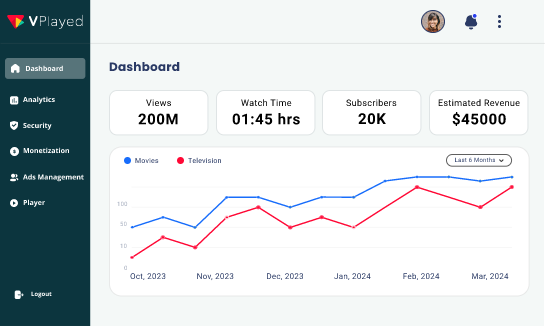
Your guide is a game-changer for aspiring streamers like me who dream of having their own platform. The insights on content delivery networks and live streaming capabilities are eye-opening.
Your article is a treasure trove for creators like me looking to create into the streaming app. The tips on integrating different types of media and optimizing for high-quality visuals are spot-on.
Monetizing a streaming app can be complex, but your guide dissects the strategies brilliantly. From subscription models to ad integration, you’ve covered it all. The evolving trends in in-app purchases and exclusive content are intriguing.
Building a streaming app is a venture that requires careful planning, and your article offers a roadmap for success. The focus on market research, competitor analysis, and scalability is enlightening.
Your article perfectly captures the innovation and possibilities of streaming app development in 2023. The discussions on augmented reality and social integration open up exciting avenues.
Your article about Building a streaming app is good, and your step-by-step guide simplifies the process. The insights on choosing the right tech to create and optimizing the streaming app for various devices are incredibly helpful.
I have always been curious about the creating a streaming app, and your post dives right into it. The emphasis on user experience and ensuring smooth playback is crucial. The tips on starting the streaming application is integrating interactive features and monetization options have given me a lot to consider.